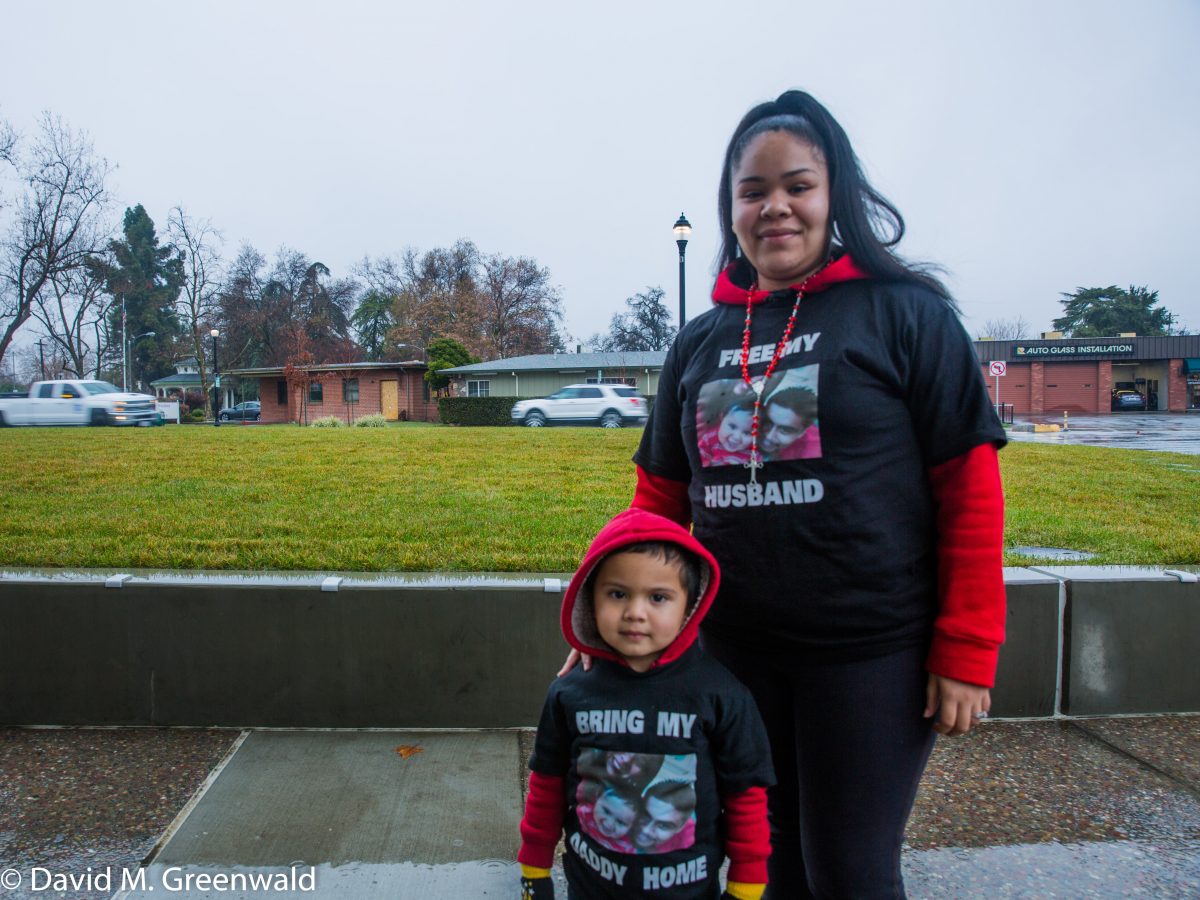
On Friday at 8:30 am, Judge David Rosenberg is set to hear motions for a new trial in the case of Ricky Hernandez and Joshua Cadenaz-Lopez, who were convicted of multiple robberies along with gang and weapons enhancements. Mr. Hernandez faces 85 years in prison while Mr. Cadenaz-Lopez faces 85 to 100 years if the convictions are allowed to stand.
Last week, the family of Mr. Cadenaz-Lopez joined other families of recently convicted defendants in arguing that he was wrongly convicted.
Attorney Jem Martin argues in his motion that Mr. Cadenaz-Lopez “was denied a fair trial, in that the jury did not deliberate, per instructions or according to law; there was insufficient evidence to support the four robbery convictions; and the court made significant errors in its rulings on key issues presented at trial and in the instructions given to the jury.”
Mr. Martin argues that “the evidence was insufficient in several respects. There was substantial, uncontroverted evidence which supported Defendant’s alibi that he was not present at the robberies because he was passed out at home during that time, high on some combination of alcohol, marijuana and narcotics.”
He points to the testimony of three individuals who “all corroborated the reasonable conclusion that (Mr. Cadenaz-Lopez) was passed out.” Indeed, he argues, “The prosecution’s own evidence showed (Mr. Cadenaz-Lopez) constantly high on narcotics and marijuana, consuming alcohol and drugs, and acting sluggish, groggy and passing out. Every police officer who came into contact with (Mr. Cadenaz-Lopez), testified that he appeared to be ‘very high’ on something when they were interacting with him. (Mr. Cadenaz-Lopez) is recorded, admitting several times, that he has significant addiction issues.”
He argues, “The jury could not reasonably have discarded all of this evidence and still comply with their instructions on how to evaluate circumstantial evidence and evidence, in general, applying 
the beyond-a-reasonable-doubt standard.”
Mr. Martin argues “there also was substantial evidence that the person wearing the green gloves in the robberies, who was alleged to have been (Mr. Cadenaz-Lopez), was actually an uncharged third party, Alec Jorrin.”
Mr. Martin notes, “The Defense produced evidence that showed that Mr. Jorrin was wearing the exact same shoes, in a video taken just weeks before the robberies that he wore in the robberies. The shoes attributed to Mr. CADENAZ, which were found at another defendant’s residence, do not match the shoes worn by the actual robber, in the surveillance videos.
“In the same video showing Mr. Jorrin wearing the shoes that he wore in the robberies, he is wearing shorts that are the exact same style and size, although a different color, as those that he wore in the robberies. Mr. Jorrin is a known associate of the Broderick Boys and had the same motive and opportunity as did any of the other charged and uncharged co-defendants in this case to participate in the robberies.”
He continues: “Every police officer, who testified at trial, with the exception of former Detective Herrera, said that Mr. Jorrin was still under investigation for suspected involvement in the charged robberies and that they thought that he was involved, in some unknown way, but that there just wasn’t sufficient evidence to arrest him for their suspicions.”
He concludes: “The jury could not, beyond-a-reasonable-doubt, eliminate the possibility that Mr. Jorrin was the actual robber, not (Mr. Cadenaz-Lopez).”
In their press conference last week, Joshua Cadenaz-Lopez’s mother questioned the identification of her son from the video. She said, “Josh has extremely hairy legs and skinny chicken legs. In the surveillance video of the robberies, the person that they are saying is my son, (he) has thick white hairless legs.
“My son has a tattoo on his chest of his daughter’s footprints and name – that clear(ly) would show through a tank top that the person in the (video) did not even have.”
She was also critical of the fact that the police did not follow through on the alibi, where Mr. Cadenaz-Lopez had multiple witnesses (saying) that he was at home, passed out during the time of the robberies.
“He’s paying the time right now for somebody else’s crime,” she said. “In the trial, the police all contradicted one another and nobody wanted to stand up and take responsibility for the investigation.
“There was so much questionable evidence, I don’t know how the jury found my son guilty at all,” she said. “They just made him to look like a gang member and so the jury found him guilty.”

Public Defender Lisa Lance in her motion for a new trial for Mr. Hernandez, asks the judge to throw out convictions on the stand-alone gang charges and gang enhancements, which are in part responsible for the lengthy nature of his sentence. She writes, “Mr. Hernandez is asking for a new trial on only those charges as the verdicts are contrary to the standard and enhancements, and is requesting that Enhancement 2a be dismissed as contrary to the law.”
Ms. Lance notes that “the Court allowed the prosecutor to put up on the screen during closing argument material information that was blatantly false, to include that law enforcement found a gun in Mr. Hernandez’ Gold Acura. Counsel’s objection was overruled, and counsel was admonished for objecting.”
Ms. Lance argues that there is insufficient evidence to support the notion that Mr. Hernandez was in a gang for the purposes of the stand-alone gang charges (186.22(a)).
She argues, “Mr. Hernandez was not in any gang photos, cell phone videos, YouTubes, and had no prior contacts with Broderick Boy members. The only exception presented was that some months later, while Mr. Hernandez remained in custody, a known gang member sent out a RAP video that mentioned ‘free’ Mr. Hernandez.
“There was absolutely no evidence that Mr. Hernandez participated in the video, asked for the video, or even knew about the video until he heard it in Court.”
She added, “There also was evidence Mr. Hernandez had tattoos and wore some red clothing that tended to show he was a Northerner, at least at some point years before the conduct in question here. But his conduct on the few occasions he was contacted by law enforcement was less than minimal—he was always respectful, had no contraband, and was not even committing crimes on those occasions.”
Moreover she added, his biggest tattoo said “Turlock,” showing that “he was from Turlock, not Broderick.” Ms. Lance argues, “There was no evidence besides innuendo and speculation offered by the gang cops in this case that he was a Broderick Boy.”
In his opposition brief, Deputy DA Kyle Hasapes counters, “Detective Boudinot gave testimony that all of these things were related to the Broderick Boys and showed his active membership in the Broderick Boys criminal street gang.”
He based this opinion on “previous gang related contacts” dating back to 2013. He noted, “[W]hile Defendant Hernandez was in the interview room he referred to the others as loved ones, he repeatedly told the others not to snitch.” Further, he noted that “Defendant Hernandez had several Norteno and Broderick Boys related tattoos.”
The evidence, Mr. Hasapes writes, “was more than sufficient evidence to support Detective Boudinot’s conclusion that Defendant Hernandez was an active Broderick Boy.”
For instance, Mr. Hasapes notes: “According to Detective Boudinot the statements from defendant Hernandez to Mr. Baeza regarding not snitching are important because criminal street gangs do not tolerate snitching. Snitching is considered the lowest form of person. Snitches are going to be dealt with immediately and typically violently when information could get another person in trouble with law enforcement.”
As stated above, the motions for a new trial will be heard on Friday morning with the two scheduled to be sentenced on February 2 in front of Judge David Rosenberg.
—David M. Greenwald reporting
Families Call for Justice in Two Recent Wrongful Conviction Cases in Yolo County






